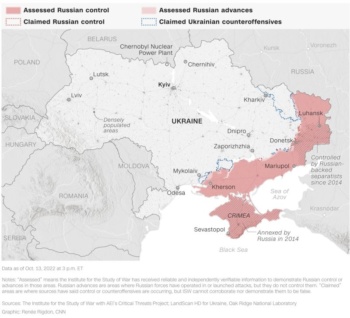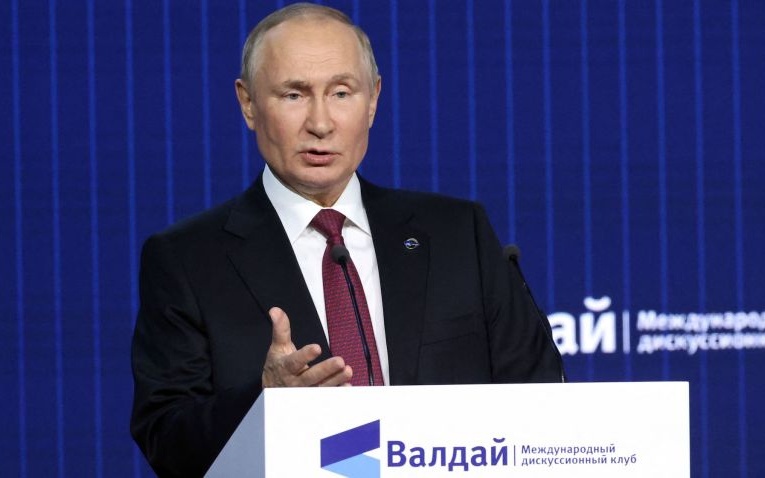Thursday’s Coverage: Russia Strikes Kyiv and Zaporizhzhia Again

Source: CNN
UPDATE 1527 GMT:
At least four people have been killed and 10 wounded in the latest Russian attacks on Ukrainian-held areas of the Zaporizhzhia region in southern Ukraine.
The Russians attacked several towns from their base at the occupied Zaporizhzhia power plant across the Dnipro River, damaging dozens of residential buildings and cutting power to thousands of people.
UPDATE 1521 GMT:
Ukraine Air Force spokesman Yuriy Ihnat says Kyiv’s forces have downed more than 300 Iranian Shahed-136 “kamikaze” drones used in Russian attacks.
Ukraine Foreign Minister Dmytro Kuleba reports a phone call from Hossein Amir-Abdollahian, who has denied any transfer of Iranian weapons to Moscow.
Today, I received a call from Iranian Foreign Minister Hossein Amir Abdollahian, during which I demanded Iran to immediately cease the flow of weapons to Russia used to kill civilians and destroy critical infrastructure in Ukraine.
— Dmytro Kuleba (@DmytroKuleba) October 28, 2022
UPDATE 0937 GMT:
Ukraine President Volodymyr Zelenskiy addresses the nation on Thursday night from a dark Kyiv street, amid Russian attacks that have knocked out 1/3 of the country’s energy infrastructure.
He said that Russia had deployed a “flock” of more than 30 Iranian-supplied Shahed-136 “kamikaze” drones in its latest attacks, but Ukrainian air defenses had downed 23 of them.
Zelensky delivers address in pitch-black Kyiv, beginning, “Good evening, warriors of light, energetic people who are always ready to fight.” He likes Russia to Nazi Germany, noting the 80th anniversary of Nazi defeat. “Evil, which seemed to be defeated…in 1945, is reborn…” pic.twitter.com/sr3ZtyIaPl
— Christopher Miller (@ChristopherJM) October 28, 2022
UPDATE 0849 GMT:
The Ukraine military says Russia has moved another 1,000 newly-mobilized men to the frontline in the Kherson region in southern Ukraine.
The Ukrainians have pointed to the deployment of thousands of the men, with inadequate training and supplies, as a sign of depleted Russian forces trying to hold back Ukraine’s counter-offensive.
UK military intelligence echoes the assessment:
This is from an extremely low level of manning….Even if Russia succeeds in consolidating long-term defensive lines in Ukraine, its operational design will remain vulnerable.
To regain the initiative, it will need to generate higher-quality, mobile forces which are capable of dynamically countering Ukrainian breakthroughs and conducting their own large-scale offensive operations.
UPDATE 0651 GMT:
Vladimir Putin’s first deputy chief of staff, Sergey Kiriyenko, has visited Russian-occupied Kherson city in southern Ukraine.
As a Ukrainian counter-offensive advances in the Kherson region, Kiriyenko visited the port which is moving Ukrainians from the right bank to the left bank of the Dnipro River.
A former head of Russia’s atomic energy agency Rosatom, Kiriyenko also visited the Zaporizhzhia nuclear plant, used by Russian forces as a base to attack Ukrainian-held territory.
UPDATE 0630 GMT:
International Atomic Energy Agency head Rafael Grossi has indicated that inspectors will quickly refute Russia’s disinformation about a Ukrainian “dirty bomb”.
Grossi confirmed on Thursday that IAEA inspectors will visit two sites in Ukraine and that he expects them to reach a conclusion “in days very fast”.
UPDATE 0620 GMT:
US officials confirm that the Biden Administration is sending another $275 million in military aid to Ukraine.
The US has now sent about $17 billion in weapons and other military assistance to Kyiv.
UPDATE 0407 GMT:
Russian journalist Ksenia Sobchak, the daughter of Vladimir Putin’s former boss, has fled to Lithuania after police in Moscow raided one of her homes.
The TV personality’s father is former St. Petersburg Mayor Anatoly Sobchak, whom Putin has described as his mentor. She is rumored to be Putin’s goddaughter.
The younger Sobchak ran for the Russian Presidency in 2018, seen by many as a Kremlin publicity stunt to feign competitive elections.
Russian media said Sobchak crossed the Belarus-Lithuania border on Tuesday night, after tricking Russian authorities by buying plane tickets from Moscow to Dubai via Istanbul.
The head of Lithuania’s counter-intelligence service confirmed that Sobchak is in the country. She used her Israeli passport because of Lithuania’s strict limits on entry by Russians.
Vladimir Putin has acknowledged that he ordered Russia’s disinformation campaign which claims Ukraine is preparing to use a “dirty bomb”.
Defense Minister Sergey Shoygu launched the effort in a series of phone calls to US, UK, French, and Turkish counterparts last weekend, with follow-ups to Indian and Chinese ministers. The military and Defense Ministers have had high-profile presentations which have been exposed for using fake images.
In an address to the Valdai Club in Moscow, Putin said Thursday that he knew “about an incident with a so-called ‘dirty bomb’ being prepared”, and that he knew “where, generally, it was being prepared”.
He offered no evidence to support his allegation of explosive laced with radioactive material.
The US, UK, and France immediately called out the disinformation as a move for Russian escalation, with a possible “false flag” attack which would be blamed on the Ukrainians.
On the invitation of the Zelenskiy Government, the International Atomic Energy Agency is visiting two nuclear sites. The agency inspected one of the sites this summer and confirmed that it is in full compliance with non-proliferation regulations.
Warning Moscow Over Nuclear Weapons
US President Joe Biden reiterated on Wednesday:
Let me just say Russia would be making an incredibly serious mistake if it were to use a tactical nuclear weapon. I’m not guaranteeing that it’s a false-flag operation yet. We don’t know. It would be a serious, serious mistake.
Putin portrayed himself as the victim on Thursday, saying the discussion of possible use of nuclear weapons was designed to show “what a bad country Russia is”.
“We have never said anything about the possible use of nuclear weapons by Russia, but only hinted at the statements made by the leaders of western countries,” he insisted.
The Russian leader said little of relevance to his seven-month invasion. Instead, he used the address to justify the elimination of Ukraine as an independent nation, and to appeal to Asian, African, and Latin American to support Moscow.
He proclaimed that the “single real guarantee of Ukrainian sovereignty” can only be Russia, which “created” Ukraine. Creating his “historical fact”, he said Ukrainians and Russians are fundamentally “one people” that were wrongly separated into “different states”.
Putin railed about the “West” and their “hegemony” in what is “probably the most dangerous, unpredictable and, at the same time, important decade since the end of World War II”.
He said “of course, we have costs ” from the invasion: “I think about it all the time. There are economic losses.”
He then insisted that the Russian economy had overcome the sanctions over the assault on Ukraine.

